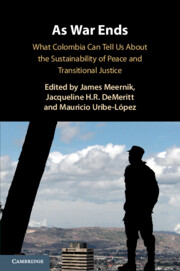Book contents
- As War Ends
- As War Ends
- Copyright page
- Contents
- Contributors
- Acknowledgments
- Introduction
- 1 The Complexity of the Organizational Design for Implementation of a Peace Accord
- 2 Violence, Grassroots Pressure, and Civil War Peace Processes
- 3 Land, Violence, and the Colombian Peace Process
- 4 Determinants of State Strength and Capacity
- 5 The Threat of Organized Crime in Post-Conflict Colombia
- 6 Violence after Peace
- 7 Two Emblematic Peacebuilding Initiatives in Antioquia
- 8 From Counterinsurgency to Peacebuilding
- 9 Transitional Justice in the Colombian Final Accord
- 10 The Comprehensive System of Truth, Justice, Reparation, and Non-Repetition
- 11 Una Tierra Inexplorada
- 12 Leading the Public to Peace
- 13 Securing the Peace and Promoting Human Rights in Post-Accord Colombia
- 14 Achieving an Unpopular Balance
- 15 Countering Violent Extremism through Narrative Intervention
- 16 Geographies of Truth in the Colombian Transitional Justice Process
- 17 Conclusion
- Index
- References
5 - The Threat of Organized Crime in Post-Conflict Colombia
Published online by Cambridge University Press: 18 July 2019
- As War Ends
- As War Ends
- Copyright page
- Contents
- Contributors
- Acknowledgments
- Introduction
- 1 The Complexity of the Organizational Design for Implementation of a Peace Accord
- 2 Violence, Grassroots Pressure, and Civil War Peace Processes
- 3 Land, Violence, and the Colombian Peace Process
- 4 Determinants of State Strength and Capacity
- 5 The Threat of Organized Crime in Post-Conflict Colombia
- 6 Violence after Peace
- 7 Two Emblematic Peacebuilding Initiatives in Antioquia
- 8 From Counterinsurgency to Peacebuilding
- 9 Transitional Justice in the Colombian Final Accord
- 10 The Comprehensive System of Truth, Justice, Reparation, and Non-Repetition
- 11 Una Tierra Inexplorada
- 12 Leading the Public to Peace
- 13 Securing the Peace and Promoting Human Rights in Post-Accord Colombia
- 14 Achieving an Unpopular Balance
- 15 Countering Violent Extremism through Narrative Intervention
- 16 Geographies of Truth in the Colombian Transitional Justice Process
- 17 Conclusion
- Index
- References
Summary
After the demobilization of the Autodefensas Unidas de Colombia [United Self-Defense Forces of Colombia] (AUC) in the mid-2000s, Uribe’s government declared that paramilitarism had ceased to exist and that the private armies that remained in existence were simply engaged in organized crime. He gave them a name: Bandas Criminales Emergentes (Bacrím) [Emerging Criminal Gangs].
- Type
- Chapter
- Information
- As War EndsWhat Colombia Can Tell Us About the Sustainability of Peace and Transitional Justice, pp. 112 - 132Publisher: Cambridge University PressPrint publication year: 2019

